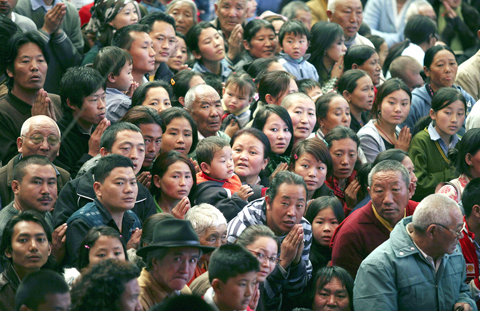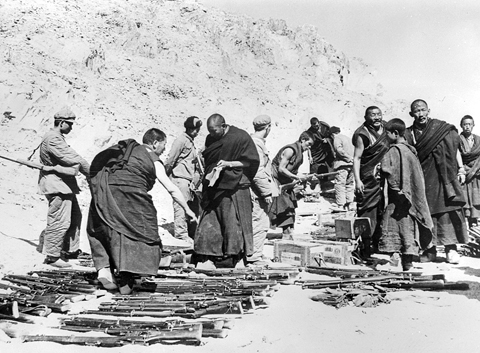Amid growing anger among Tibetan exiles at China’s subjugation of Tibet and its monasteries, bitter memories of a failed armed struggle haunt former guerrilla fighter Lhasang Tsering.
Over five decades, the Tibetan movement has drawn international attention and support for being among the world’s rare non-violent struggles, which has been credited to the Dalai Lama’s “middle way” approach, which stresses conciliatory negotiations with China.
Although the policy has made little headway with Beijing, the Dalai Lama was awarded the Nobel Peace Prize in 1989 for leading Tibet’s non-violent struggle.

PHOTO: AP
Against such a backdrop, 15 years of a violent conflict for Tibetan independence beginning in the late 1950s is looked at as a “deviation” that many Tibetans do not like to talk about.
With the passage of time and the fighters fading into congested refugee settlements, the episode has nearly been forgotten and is spoken about only in hushed tones.
But for Tsering, the armed struggle is as real as the day he joined it in northern Nepal’s Mustang district in 1972.

PHOTO: AFP
Among the prominent dissidents of the Tibetan diaspora, Tsering once worked with the Tibetan government-in-exile but resigned in 1990 to protest the Dalai Lama’s decision to give up the demand for an independent Tibet in favor of seeking autonomy within China.
A slight man with a goatee, Tsering, who also headed the Tibetan Youth Congress, has for decades criticized the middle way policy of the Dalai Lama.
“From my moral standpoint, the non-violence in surrendering to an evil is far worse than the use of violence to overcome the evil,” said Tsering, who now runs a bookshop in Mcleodganj, a suburb of Dharamsala, India.
If Tibetans do not defend themselves against a “colonial China,” they would one day disappear like the Inca civilization in South America, said the former fighter, who is now in his mid-50s.
The armed resistance against the Chinese began after the invasion of Tibet’s eastern Kham and Amdo regions by the People’s Liberation Army in the 1950s.
The Khampa fighters of the region announced the formation in 1958 of the Chushi Gangdruk — which means “four rivers, six ranges” and refers to Kham — to stop the Chinese army’s advance into Lhasa.
When the March 10, 1959, uprising against the Chinese failed, the Gangdruk guerrillas helped the Dalai Lama flee to India, Tsering said, adding that the fighters then retreated to Mustang, from where they conducted raids into Tibet and waged war with the Chinese army for 15 years.
At its peak, the force consisted of an estimated 2,000 Tibetans and received support like arms, ammunition and training from the CIA.
“We were certainly few to win against the Chinese but enough to create a lot of problems for them,” he said.
But with the US government’s rapprochement with China, aid and supplies from the CIA began to wane in the late 1960s. Nepalese troops also began a crackdown to crush the fighters.
Chushi Gangdruk’s operations finally ceased in 1974 after the Dalai Lama taped a message telling the fighters to lay down their weapons and surrender.
“The fighters could not say no to the Dalai Lama, but several committed suicide as they had vowed to fight to the bitter end,” Tsering said, choked with emotion and with tears in his eyes. “They could find freedom and dignity only in death.”
Others were arrested, killed or escaped.
Tsering still justified an armed struggle for his homeland and said he would be ready to put his “life on the line” were there an opportunity.
“It takes two to shake hands, but the Chinese found no need to shake hands with a bunch of helpless refugees,” he said, adding as an afterthought: “It takes only one to deliver a punch.”
Tsering said the exiled Tibetans have been confused and frustrated with talks with China because their movement lacks clarity of purpose. Frustration has also grown after the lack of progress after 50 years of exile following the flight of the Dalai Lama from Tibet on March 17, 1959.
Mentioning that Tibetans in Tibet were sacrificing their lives for independence, Tsering pointed toward the residence of the Dalai Lama and said: “If only the holy one would restore clarity of purpose and return to the cause of freedom.”
“He is our spiritual leader, and Tibetans are not in a position where they can question His Holiness, but to force Tibetans to choose between freedom and faith is not right,” Tsering said.

PRECARIOUS RELATIONS: Commentators in Saudi Arabia accuse the UAE of growing too bold, backing forces at odds with Saudi interests in various conflicts A Saudi Arabian media campaign targeting the United Arab Emirates (UAE) has deepened the Gulf’s worst row in years, stoking fears of a damaging fall-out in the financial heart of the Middle East. Fiery accusations of rights abuses and betrayal have circulated for weeks in state-run and social media after a brief conflict in Yemen, where Saudi airstrikes quelled an offensive by UAE-backed separatists. The United Arab Emirates is “investing in chaos and supporting secessionists” from Libya to Yemen and the Horn of Africa, Saudi Arabia’s al-Ekhbariya TV charged in a report this week. Such invective has been unheard of

US President Donald Trump on Saturday warned Canada that if it concludes a trade deal with China, he would impose a 100 percent tariff on all goods coming over the border. Relations between the US and its northern neighbor have been rocky since Trump returned to the White House a year ago, with spats over trade and Canadian Prime Minister Mark Carney decrying a “rupture” in the US-led global order. During a visit to Beijing earlier this month, Carney hailed a “new strategic partnership” with China that resulted in a “preliminary, but landmark trade agreement” to reduce tariffs — but

SCAM CLAMPDOWN: About 130 South Korean scam suspects have been sent home since October last year, and 60 more are still waiting for repatriation Dozens of South Koreans allegedly involved in online scams in Cambodia were yesterday returned to South Korea to face investigations in what was the largest group repatriation of Korean criminal suspects from abroad. The 73 South Korean suspects allegedly scammed fellow Koreans out of 48.6 billion won (US$33 million), South Korea said. Upon arrival in South Korea’s Incheon International Airport aboard a chartered plane, the suspects — 65 men and eight women — were sent to police stations. Local TV footage showed the suspects, in handcuffs and wearing masks, being escorted by police officers and boarding buses. They were among about 260 South

Chinese President Xi Jinping’s (習近平) purge of his most senior general is driven by his effort to both secure “total control” of his military and root out corruption, US Ambassador to China David Perdue said told Bloomberg Television yesterday. The probe into Zhang Youxia (張又俠), Xi’s second-in-command, announced over the weekend, is a “major development,” Perdue said, citing the family connections the vice chair of China’s apex military commission has with Xi. Chinese authorities said Zhang was being investigated for suspected serious discipline and law violations, without disclosing further details. “I take him at his word that there’s a corruption effort under